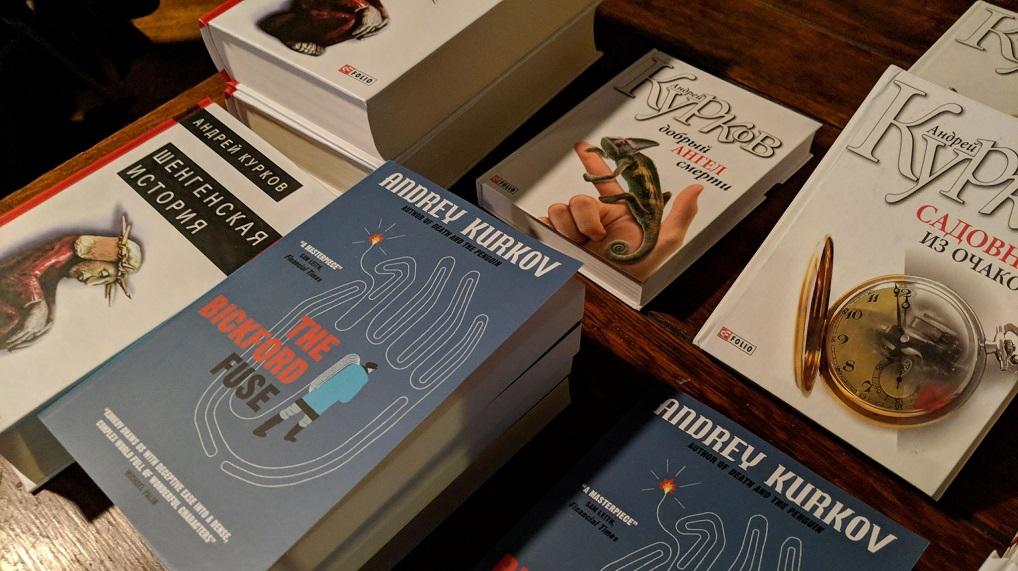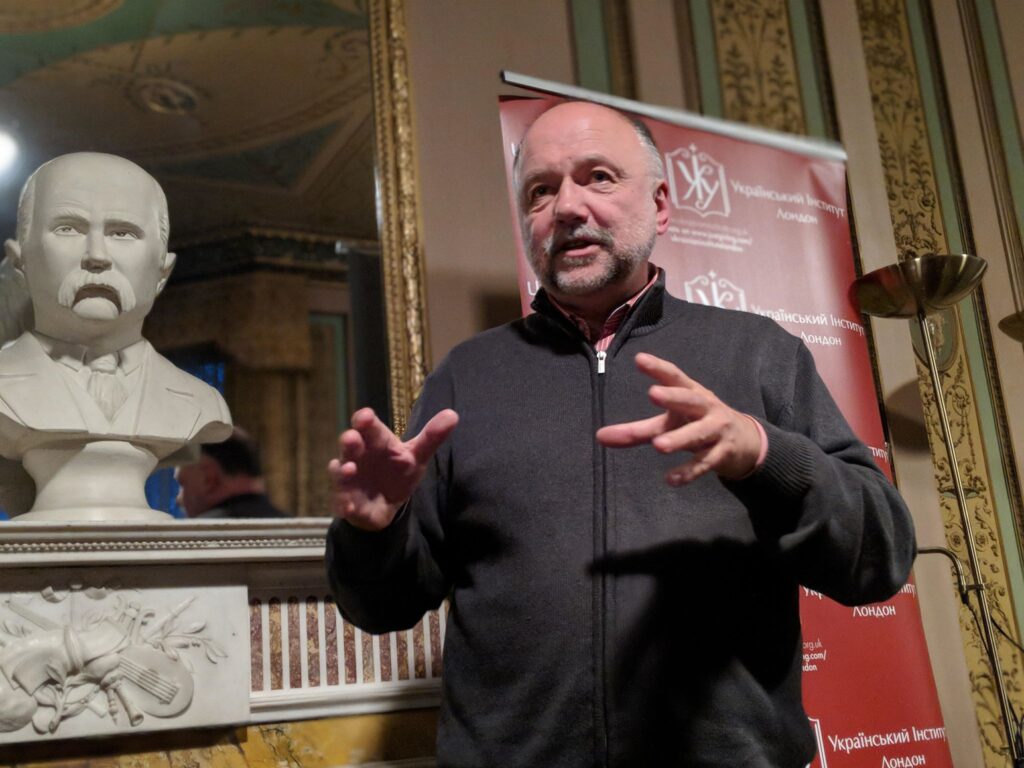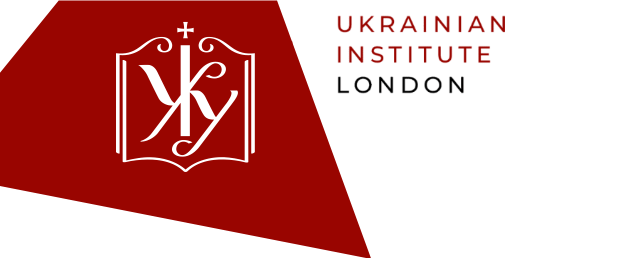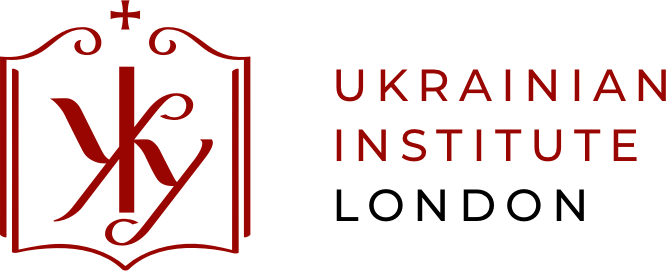Andrey Kurkov spoke to Ukrainian Institute London on how Ukraine’s Russian-language culture is distinct from the cultural world of the Russian Federation.

AUTHOR
Maria Montague, Russia and Eurasia Programme and Ukraine Forum, Chatham House. Graduate of the Ukrainian Studies programme at the University of Cambridge.
The place of the Russian language in Ukraine has long been a source of political and cultural debate, and the ongoing war in Eastern Ukraine has brought questions of language and national identity to the fore. Ukrainian Institute London invited the prominent writer and journalist Andrey Kurkov, a leading voice in the debate, to speak about this controversial topic.
Kurkov spoke in depth about his belief that Ukraine should take ownership of its Russian-language culture, which is distinct from the cultural world of the Russian Federation. Literature written in Russian is not necessarily Russian literature, as demonstrated by Kurkov’s own works: he is one of the best-selling Russian-language authors in the world, yet he emphasises that he is a Ukrainian writer. This is an important distinction, particularly against the backdrop of the Kremlin’s concept of the ‘Russian World’ (Russkiy Mir), which promotes the idea of a shared culture between Russians and their “Russian-speaking compatriots” abroad.

Kurkov argued that Russian-language literature in Ukraine is distinctive for two key reasons. First, he highlighted that it reflects Ukrainian society and culture, telling different stories to Russian-language literature of the Russian Federation. Second, Kurkov proposed that Ukraine has its own version of the Russian language, and that the linguistic differences between ‘Russian Russian’ and ‘Ukrainian Russian’ should be properly researched.
Photo: Andrey Kurkov speaking at the Ukrainian Institute London.
There are many Ukrainian authors who write in Russian and their works are rooted in Ukraine’s own cultural context:
‘Not everything written in the Russian language belongs to Russian literature, or to Russia… Ukrainian Russian-language writers are not writing about Russia, they are writing about Ukraine.’
Kurkov drew the example of his own novel Death and the Penguin (1996), which a Moscow publishing house agreed to publish only if Kurkov would change the novel’s setting from Kyiv to Moscow – since ‘nobody in Moscow wants to read about life in Kyiv’. (To which Kurkov did not agree, and so copies of this novel have only ever been exported to Russia by his Ukrainian publisher.) Kurkov also mentioned Russian-language writers from Donetsk such as Volodymyr Rafieienko, who have decided to stay in Ukraine since the outbreak of war, moving to cities in Western and Central Ukraine such as Lviv and Vinnytsia rather than to Russia. These are Ukrainian authors writing about Ukrainian realities, which is not altered by the fact that they write in Russian.
Kurkov also emphasised the linguistic as well as cultural distinctiveness of Ukraine’s Russian-language culture. The Russian language spoken in Ukraine has developed under the influence of various other languages, he noted. ‘Ukrainianisms’ are commonly used by Russian-speakers in Ukraine, not only in terms of vocabulary, but also in syntax and phonetics. The writer also pointed to the influence of Hungarian, Polish, Romanian and Slovak languages on the evolution of Russian in Ukraine.
The Ukrainian writer proposes the formation of an institute, or at least an initial group of experts, to research the linguistic differences between ‘Ukrainian Russian’ and ‘Russian Russian’, suggesting that the starting point could be to analyse works of Ukrainian Russian-language writers and to identify the distinctive forms used in the Ukrainian version of the Russian language.
Belgian, Quebecois and Maghreb literature do not belong to France, despite being written in the French language, and Kurkov believes the same logic should be applied to Russian-language literature outside of Russia.
Distinctive Russian-language cultures exist not only in Ukraine, Kurkov argued, and he drew the examples of Israel and the Baltic states. The writer highlighted that cultural mindsets and modes of thinking shape the evolution of language, and he advocates further research into the various Russian-language cultures that exist outside Russia.
Kurkov referred to the idea of “Russophonie” and compared the place of the Russian language in different national cultures with France’s loss of monopoly on French-language literature starting at the end of the 18th century. Belgian, Quebecois and Maghreb literature do not belong to France, despite being written in the French language, and Kurkov believes the same logic should be applied to Russian-language literature outside of Russia.
Kurkov’s take on this question has been met with criticism from both Russia and Ukraine. The Russian side resists the idea of Russian-language culture that does not belong to Russia geographically and the Council of the Federation, the upper house of the Russian parliament, labelled Kurkov’s proposal to research the Ukrainian version of the Russian language as ‘philological fantasy’. Kurkov’s ideas on the place of Russian in Ukrainian culture have also received a largely negative response in Ukraine itself, where he has been accused by some of supporting a new form of Russification.
The sensitivity of this question, as Kurkov himself emphasised, is a result of a long history of Russian oppression of the Ukrainian language. Under the Russian Empire many efforts were made to quash the Ukrainian language: Peter I outlawed the printing press in the Ukrainian language, Catherine the Great banned the use of Ukrainian at the ancient Kyiv-Mohyla Academy, and in 1876 Alexander II issued a ban on the printing of all Ukrainian literature, and banned Ukrainian stage performances and Ukrainian lyrics in music. During the USSR, Ukrainian-language culture enjoyed a brief period of freedom in the 1920s before it was suppressed once again, this time under Soviet rule. When Ukraine gained its independence in 1991, Ukrainian was made the official state language, and it is clear why this was a big step in terms of Ukraine asserting its own national identity. Since the Euromaidan revolution in 2014, further policies have been introduced in order to promote the Ukrainian language, for example the introduction of language quotas in the media and the 2017 education law which guarantees that schools teach mainly in Ukrainian beyond primary school level.
In light of the ongoing war with Russia, it is clear why the place of the Russian language in Ukraine is a highly charged question.
In light of the ongoing war with Russia, it is clear why the place of the Russian language in Ukraine is a highly charged question. Kurkov voiced his concern about hate speech on social media about Russian as the ‘language of the occupier’, and the failure of the Ukrainian government to address this issue. He calls for the acceptance and embrace of the Russian language as part of Ukraine’s own cultural landscape:
‘There is no need to give special status to the Russian language in Ukraine, but we should take away the Ukrainian version of the Russian language from Russian control.’
Kurkov believes that Ukraine should do more to lay claim to its Russian-language culture – and that the same logic should be applied to the cultures of other minority languages in Ukraine, including Hungarian, Crimean Tatar and Romanian, among others. These different languages are part of what makes up the tapestry of Ukraine’s distinct culture, he argues.
Whilst the prevalence of the Ukrainian language continues to grow, Kurkov argues that Ukraine should also embrace the other the other languages in Ukraine and the place they hold in the country’s distinctive culture.
The writer’s suggestion that Ukraine should take ownership of its Russian-language culture is linked to a host of other complex issues, and his talk sparked a stimulating discussion amongst attendees at Ukrainian Institute London. Should Ukraine do more to accommodate its multi-cultural and multi-lingual society? Could a Ukrainian-Russian dictionary be developed? How should Ukrainians relate to Soviet and Russian Imperial culture? What are the links between language and religion?
Kurkov touched upon many challenging questions for Ukraine, which are difficult to answer during the turbulent period that the country is experiencing. Whilst the prevalence of the Ukrainian language continues to grow, Kurkov argues that Ukraine should also embrace the other the other languages in Ukraine and the place they hold in the country’s distinctive culture. We should think of Ukraine as a shareholders company, he says, where the Ukrainian language holds the majority of shares, and other shareholders also need to be respected.
The full video of Kurkov’s presentation at Ukrainian Institute London is available on our YouTube channel – please click the video below.



